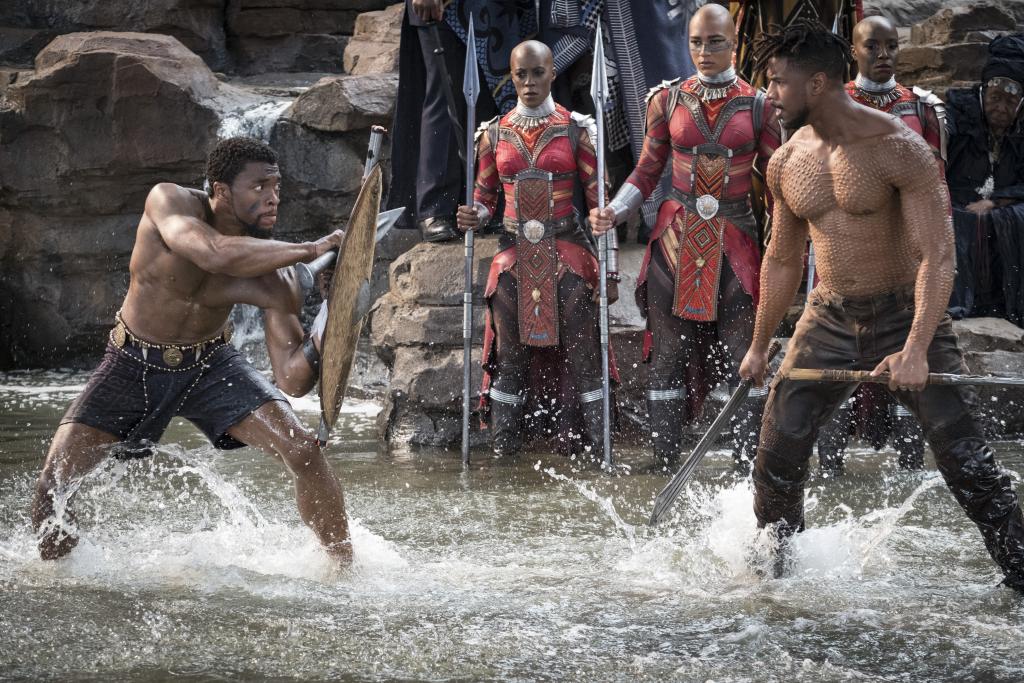Black Panther: Escapism or Afrofuturism?

‘Black Panther’ has been hailed as the first mega budget film directed and co-written by African-Americans, with a Black hero, strong female characters and a cast that is almost entirely Black.
Whether you find the movie more reactionary than revolutionary, or vice versa, there is little doubt that it has entered the history books in chalking up multiple awards, especially for its amazing African-inspired costume designs, production design and soundtrack.
This sounds like progress for Black representation in the mega budget movie industry. But, outside the million-dollar fantasy category, other acclaimed films by Black directors that focus on real-life Black leads, like Selma (2014), achieved mainstream success but were less hyped.
‘Black Panther’ was released on 12 February 2018, in the middle of a political cycle where systemic racism across the USA was gaining greater recognition through the Black Lives Matter movement, and where white supremacists were emboldened to march in the full glare of the media spotlight with banners and symbols declaring their ideology of hate.
In this worrying climate of rising threats against black lives, a movie featuring thrilling black superheroes - set largely in the powerful Afrofuturist kingdom of Wakanda in the heart of Africa - struck an emotive chord.
Afrofuturism means different things to different people, but finds adherents across the arts; Sun Ra, George Clinton, Jimi Hendrix, Janelle Monáe, Tomi Adeyemi, Octavia Butler, Colson Whitehead, Nnedi Okorafor, to name but a few. The movement has old roots in the search for alternate histories and utopian visions that challenge representations of a future shaped in the image of a dominant white culture, in which Black people are absent or remain marginalised.
The suppression of African cultural practices was a central pillar of systems of enslavement in the Americas, while the cultural imperialism of the west threatened the cultural survival of colonised peoples in many parts of the world.
In the triumphalist imperial version of history, a morally and culturally evolved west was supposed to sweep away cultures considered inferior, in order to replace them with western civilisation.
Afrofuturist works often reflect their authors’ needs to counter these persistent stereotypes based on debunked pseudosciences of race and triumphalist historical narratives, while recovering a healing pride in an African ancestral heritage. African arts, symbols and mythologies are among Afrofuturism’s ingredients, along with speculative fiction and fantasy. But, the movement draws on multiple sources, and reaches well beyond escapism from pain and oppression to address key political and moral issues and humanity as a whole.
In ‘Black Panther’ the plot is driven by the competing perspectives of the protagonist hero T’Challa, played by Chadwick Boseman, and his antagonist cousin Erik Stevens aka ‘Killmonger’, played by Michael Jordan, who challenges T’Challa’s claim to Wakanda’s throne.
Erik Killmonger grew up to become a US covert operations soldier after he was orphaned in Oakland CA as a child. Although he was fathered by a member of Wankanda’s ruling dynasty, he bears the anger and stigma of having had his African inheritance stripped away from him, which he makes visible on his body by covering it with scarification marks, each one corresponding to someone he has killed.
When Killmonger challenges T’Challa for Wakanda’s throne in single combat, his aim, as victor, is to share Wakanda’s high-tech, vibranium-powered weaponry with operatives of African descent around the world to help them overcome their oppressors and create a Wankandan empire. After Killmonger’s faction is defeated in an epic battle, and T’Challa is brought back from near death to dispatch his antagonist in a second fight, Wakanda abandons its isolationist policy and opens its first outreach centre in Oakland, to be led by T’Challa’s genius sister Shuri. At the end of the film, T’Challa is shown addressing the United Nations to reveal Wakanda’s true identity as the most technologically advanced nation in the world.
‘Black Panther’ features an impressive cast of African-American and African stars, but the principal star of the movie is actually Wakanda. As an African civilization that has never been colonized, Wakanda holds the ancestral flame of a pure African identity, undamaged and undefiled by the slave trade or European conquest.
Once T’Challa abandons his isolationist policy at the end of the movie, all the grandeur, genius and power of Wankanda can be brought to bear in serving its new global role. Wakanda’s heroic role is to bring redemption to people of African descent who have suffered the demoralizing stigma and inherited trauma of enslavement, colonization and racism.
The role of the protagonist in a superhero movie is always to save the world order and redeem the status quo. ‘Black Panther’ is no exception. It uses exhilarating Afrofuturist scenography to deliver an escapist fantasy of redemption, dispensed by a heroic African super-elite.
In this ‘Marvel’ universe, more painful processes of redemption, represented through the day-to-day human heroics of the African-American civil rights struggle, for instance, are bypassed. Unlike Marvel’s Wakanda, the real-world grandeur and genius of Africa’s precolonial empires, like Ghana, Mali, Kongo, and Benin, was not achieved in pure isolation, but developed in context of far-reaching economic and diplomatic links with other peoples and states.
However, it would be a mistake to take the movie too seriously, and the recent tragic death of Chadwick Boseman puts things in harsh perspective. At the June 2018 MTV Movie Awards, where Boseman was given the award of “Best Hero” for his portrayal of T’Challa, he reminded his audience to keep things real.
During the ceremony he immediately handed over his award to James Shaw Jr., who had won praise for tackling a gunman terrorising the occupants of a Waffle House franchise in Tennessee on 22 April 2018. Boseman told his audience that: “Receiving an award for playing a superhero is amazing, but it’s even greater to acknowledge the heroes that we have in real life.”
Image: Chadwick Boseman and Michael B Jordan in Black Panther. Photograph: Allstar/Marvel Studios/Disney
